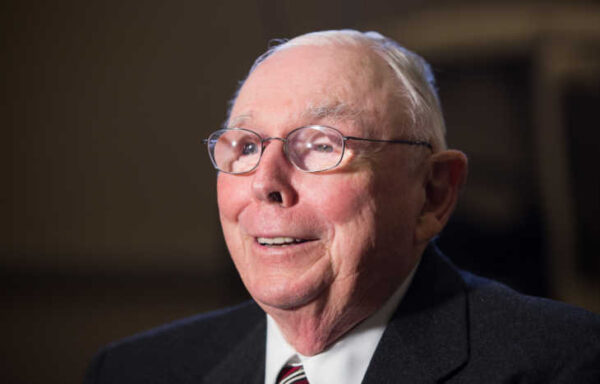The “Biden Bump” Powers the Market Higher
- A growing political movement powered by Bernie Sanders is openly hostile to wealth creation and fosters resentment toward investors.
- Today, Alexander Green discusses this alarming development and why it’s all wrong.
Although the number of reported coronavirus cases continued to rise Wednesday, the stock market soared, with the Dow tacking on more than 1,000 points.
It appears as though a coordinated response to the virus is meeting with some success. But there was another factor at play: Super Tuesday’s results.
A week ago, it looked as though self-described democratic socialist Bernie Sanders would win the Democratic nomination for president.
But Joe Biden’s victories showed that this is still a two-man race. And the stock market – particularly health insurance stocks – celebrated.
UnitedHealth (NYSE: UNH) and Cigna (NYSE: CI) rose 11%. Centene (NYSE: CNC) and Anthem (NYSE: ANTM) jumped 16%. And Molina (NYSE: MOH) soared 17%… in a single session.
Medicare for All would mean the end of private health insurance for all. So the market response was entirely rational.
The rally may have legs if Sanders continues to falter, as he has amply demonstrated that he is openly and proudly hostile to wealth creation.
If you are the kind of person who works, saves and invests – the typical reader of this column in other words – pay close attention.
Sanders is sowing bitterness, anger and resentment. And he wants it directed toward you: investors, entrepreneurs and business folks.
This is not just an unfortunate development. It’s an alarming one.
Historically, there has been a striking lack of class envy in this nation. We have typically celebrated others’ success rather than resenting it.
I grew up in a small town in the South. And while my father worked to support our family of six on a salary that would be well below today’s poverty line, I never felt anything but respect and admiration for the townspeople who were successful business owners and investors.
When they walked by I often thought to myself, “There goes someone who was just a little bit smarter… or worked a little bit harder… or took a bigger risk than the rest of us. And it paid off.”
Far from resenting these men and women, I admired them. I strove to emulate them. And – looking back – to a great extent, I did.
Contrary to what Sanders would have you believe, most rich people in this country did not inherit their money or steal it or rack up a fortune as investment bankers.
We know from the decades of research done by Thomas Stanley, author of the bestselling The Millionaire Next Door: The Surprising Secrets of America’s Wealthy and other books, that the typical route is far more pedestrian.
Most millionaire households – and there are over 11 million of them in the U.S. according to Spectrem Group – maximized their income. They kept a sharp eye on expenses. They religiously saved and invested the difference. And they let their money compound, not just for years but for decades.
That is how ordinary people create extraordinary wealth.
Yes, millions also became wealthy by starting and running a successful business. And the more people they served, the wealthier they generally became.
Bill Gates became a multibillionaire by helping people all over the world become more productive.
Oprah Winfrey became a multibillionaire by helping millions of people – mostly women – improve their lives.
Jeff Bezos became a multibillionaire by helping people get what they want and need faster and cheaper. (Half of American households now have an Amazon Prime membership.)
You notice the common denominator here? Helping people.
You don’t get rich by thinking about yourself. You get rich by thinking about other people, about what they want and how you can deliver it better, faster or cheaper.
That’s the great thing about capitalism. You can have whatever you want if you just provide enough other people with what they want.
What a beautiful foundation for an economic system. No wonder our economy is larger than the next three – China, Japan and Germany – combined.
Yet Sen. Sanders insists I’ve got it all wrong.
It’s not that businesspeople make our lives better by meeting our wants and needs or that investors create jobs and increase prosperity.
His narrative is that these folks are oppressing us, holding us down and lowering our standard of living.
You’re not a beneficiary of capitalism. You’re a victim of it. Wake up!
This is utter nonsense. But that doesn’t mean millions of Americans aren’t buying it.
Those of us who work and save and invest – who believe that our free market system gives everyone the opportunity to rise as far as their talents and persistence will take them – have an obligation to speak out.
And in my next column I’ll explain exactly how and why.
About Alexander Green
Alexander Green is the Chief Investment Strategist of The Oxford Club, the world’s largest financial fellowship. For 16 years, Alex worked as an investment advisor, research analyst and portfolio manager on Wall Street. After developing his extensive knowledge and achieving financial independence, he retired at the age of 43.
Since then, he has been living “the second half of his life.” He runs The Oxford Communiqué, one of the most highly regarded publications in the industry. He also operates three fast-paced trading services: The Momentum Alert, The Insider Alert and Oxford Microcap Trader. In addition, he writes for Liberty Through Wealth, a free daily e-letter focused on financial freedom.
Alex is also the author of four New York Times bestselling books: The Gone Fishin’ Portfolio: Get Wise, Get Wealthy… and Get On With Your Life; The Secret of Shelter Island: Money and What Matters; Beyond Wealth: The Road Map to a Rich Life; and An Embarrassment of Riches: Tapping Into the World’s Greatest Legacy of Wealth.






